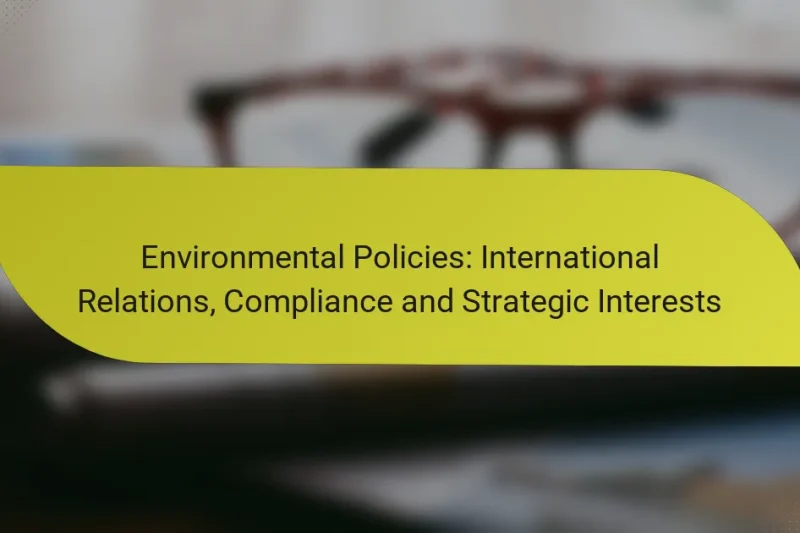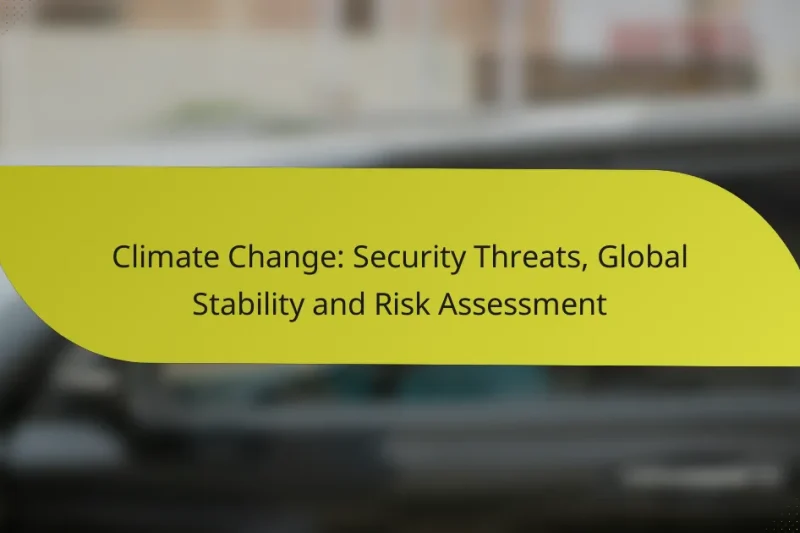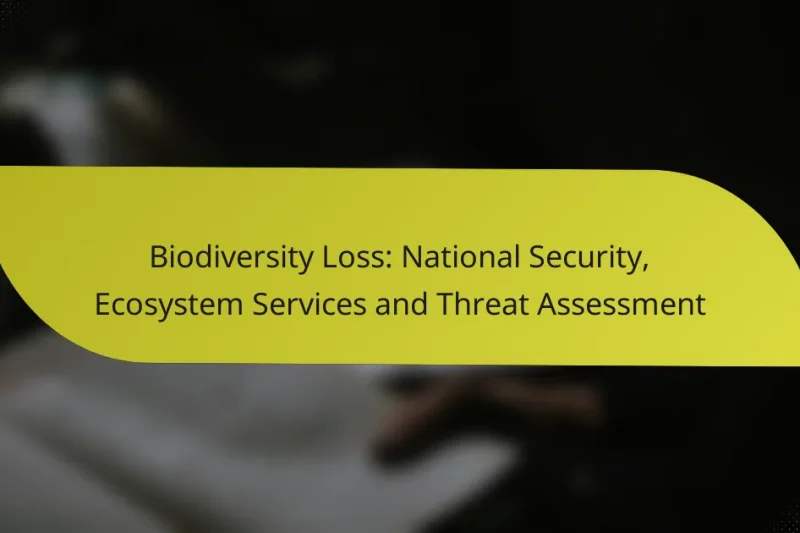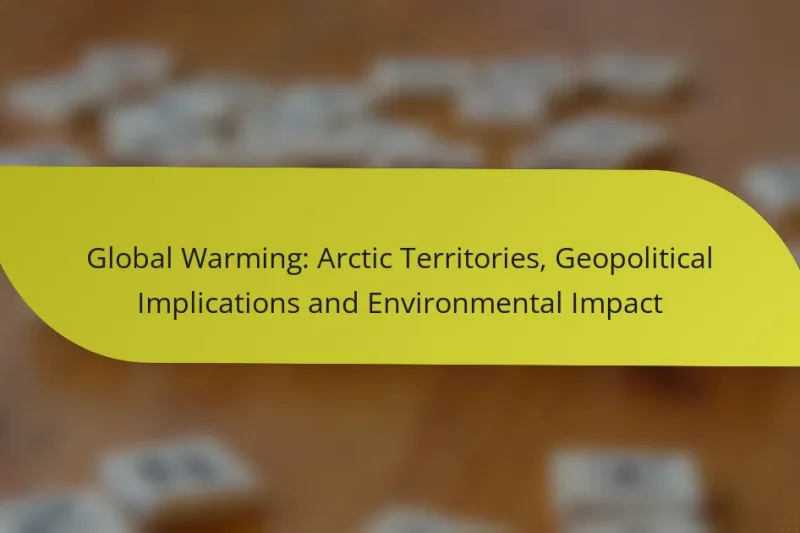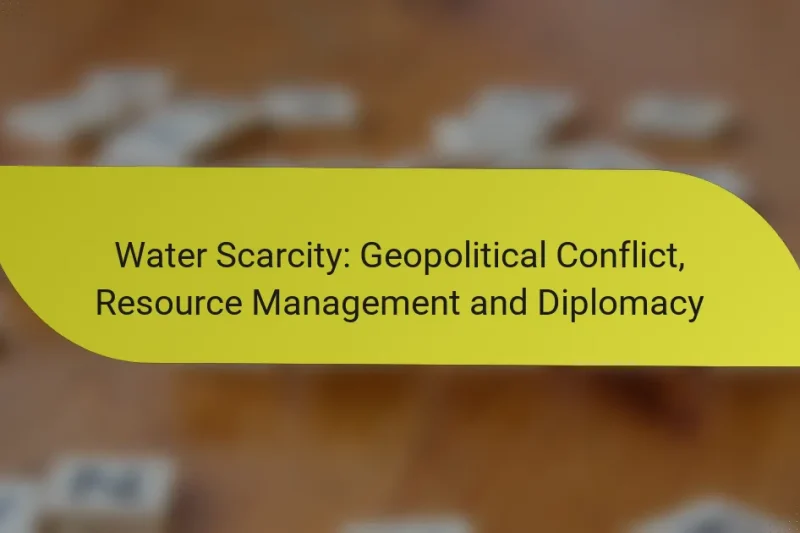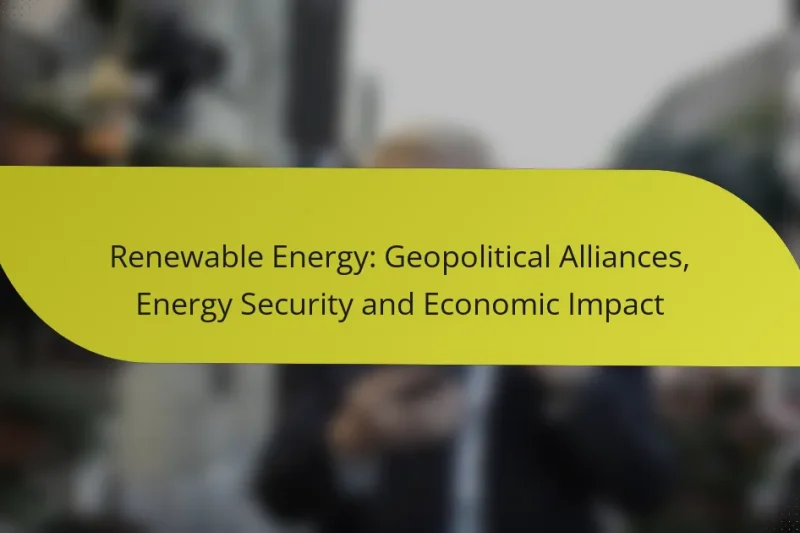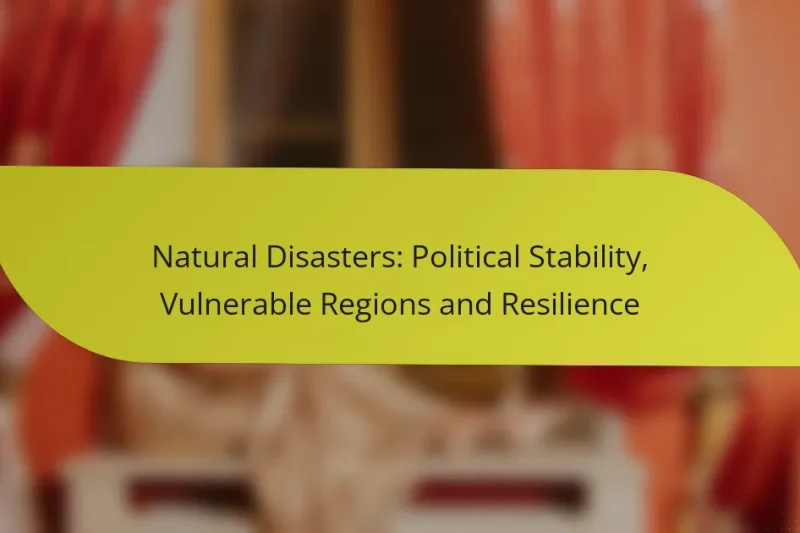Environmental policies play a crucial role in shaping international relations, influencing trade dynamics, diplomacy, and global … Environmental Policies: International Relations, Compliance and Strategic InterestsRead more
Environmental Issues Shaping Geopolitical Trends
Environmental issues are playing a pivotal role in shaping geopolitical trends, particularly in Europe, by driving migration, creating resource scarcity, and influencing energy policies. As challenges like deforestation, water scarcity, and pollution escalate, they not only threaten ecosystems but also alter international relations and resource distribution. Countries are increasingly responding with policy changes and investments in green technologies to address these urgent challenges and promote long-term sustainability.
Climate Change: Security Threats, Global Stability and Risk Assessment
Climate change is a critical security threat that intensifies natural disasters, resource scarcity, and geopolitical tensions, … Climate Change: Security Threats, Global Stability and Risk AssessmentRead more
Biodiversity Loss: National Security, Ecosystem Services and Threat Assessment
Biodiversity loss poses a critical threat to national security by destabilizing ecosystems, leading to resource scarcity, … Biodiversity Loss: National Security, Ecosystem Services and Threat AssessmentRead more
Global Warming: Arctic Territories, Geopolitical Implications and Environmental Impact
Global warming is profoundly transforming Arctic territories, leading to accelerated ice melting and significant ecological shifts. … Global Warming: Arctic Territories, Geopolitical Implications and Environmental ImpactRead more
Water Scarcity: Geopolitical Conflict, Resource Management and Diplomacy
Water scarcity poses significant challenges that can lead to geopolitical conflicts as nations vie for limited … Water Scarcity: Geopolitical Conflict, Resource Management and DiplomacyRead more
Renewable Energy: Geopolitical Alliances, Energy Security and Economic Impact
Renewable energy is reshaping global dynamics, where geopolitical alliances play a crucial role in determining access … Renewable Energy: Geopolitical Alliances, Energy Security and Economic ImpactRead more
Natural Disasters: Political Stability, Vulnerable Regions and Resilience
Natural disasters pose a significant threat to political stability, particularly in vulnerable regions where governance structures … Natural Disasters: Political Stability, Vulnerable Regions and ResilienceRead more
How are environmental issues influencing geopolitical trends in Europe?
Environmental issues are increasingly shaping geopolitical trends in Europe by driving migration, creating resource scarcity, and influencing energy policies. These factors are interconnected and often lead to shifts in political alliances and conflicts among nations.
Climate change impacts on migration
Climate change is a significant driver of migration in Europe, as extreme weather events and rising sea levels displace populations. Countries in Southern Europe, particularly those bordering the Mediterranean, face increased pressure from migrants fleeing climate-related disasters.
As migration patterns shift, European nations must adapt their policies to manage the influx of climate refugees. This can lead to political tensions, especially in regions already facing economic challenges or social unrest.
Resource scarcity and conflict
Resource scarcity, particularly related to water and arable land, can lead to conflicts between nations. In Europe, countries sharing river systems may experience disputes over water allocation, especially during droughts exacerbated by climate change.
Additionally, competition for agricultural resources can heighten tensions, particularly in Eastern Europe, where agricultural productivity is vital for economic stability. Collaborative management of shared resources is essential to mitigate potential conflicts.
Energy transition and political alliances
The transition to renewable energy sources is reshaping political alliances in Europe. Nations heavily reliant on fossil fuels are increasingly seeking partnerships with countries that have abundant renewable resources, such as wind or solar energy.
For example, countries in Northern Europe are forming alliances to promote offshore wind energy, while Southern European nations are investing in solar power. These shifts not only influence energy security but also alter traditional geopolitical relationships based on fossil fuel dependencies.
What are the key environmental challenges facing global politics?
Key environmental challenges impacting global politics include deforestation, water scarcity, and pollution. These issues not only threaten ecosystems but also influence international relations, resource distribution, and public health.
Deforestation and biodiversity loss
Deforestation significantly contributes to biodiversity loss, as forests are home to a vast array of species. The removal of trees for agriculture, urban development, and logging disrupts habitats and accelerates extinction rates.
Countries with high deforestation rates, such as Brazil and Indonesia, face international pressure to implement sustainable practices. Effective strategies include reforestation, enforcing logging regulations, and promoting agroforestry to balance economic needs with environmental protection.
Water scarcity and access
Water scarcity is a pressing issue that affects millions globally, leading to conflicts over water resources. Regions like the Middle East and parts of Africa experience severe shortages, impacting agriculture, health, and economic stability.
Addressing water scarcity involves improving water management practices, investing in infrastructure, and promoting conservation efforts. Countries can adopt policies that encourage efficient water use and develop technologies for desalination and wastewater recycling.
Pollution and public health
Pollution poses significant risks to public health, contributing to respiratory diseases, waterborne illnesses, and environmental degradation. Urban areas often struggle with air and water pollution, affecting vulnerable populations disproportionately.
To combat pollution, governments can enforce stricter regulations on emissions and waste disposal, promote clean energy sources, and invest in public transportation. Public awareness campaigns can also encourage individuals to reduce waste and adopt sustainable practices.
How do countries respond to environmental crises?
Countries respond to environmental crises through a combination of policy changes, investments in green technologies, and fostering public awareness. These responses are crucial for addressing immediate challenges and promoting long-term sustainability.
Policy changes and international agreements
Governments often implement policy changes to address environmental issues, which can include stricter regulations on emissions or incentives for renewable energy. International agreements, such as the Paris Agreement, play a significant role in uniting countries to commit to reducing greenhouse gas emissions.
For example, many nations have set targets for carbon neutrality by mid-century, aligning their domestic policies with global climate goals. These commitments often require legislative changes and collaboration across various sectors, including energy, transportation, and agriculture.
Investment in green technologies
Investment in green technologies is a critical response to environmental crises, as it drives innovation and reduces dependency on fossil fuels. Countries are increasingly funding research and development for renewable energy sources, such as solar and wind power, as well as energy efficiency technologies.
For instance, nations like Germany and Denmark have made substantial investments in wind energy, leading to significant increases in renewable energy production. Public and private partnerships are essential in scaling these technologies and making them accessible to a broader market.
Public awareness and activism
Public awareness and activism are vital in shaping governmental responses to environmental crises. Grassroots movements and campaigns can influence policy decisions and encourage sustainable practices among individuals and businesses.
Countries with high levels of public engagement, such as Sweden and Canada, often see more robust environmental policies. Activism can take many forms, from local clean-up initiatives to global climate strikes, all aimed at raising awareness and prompting action on environmental issues.
What role do international organizations play?
International organizations are crucial in addressing environmental issues that influence geopolitical trends. They facilitate cooperation among nations, provide funding for sustainable initiatives, and advocate for policies that promote environmental protection.
United Nations climate initiatives
The United Nations (UN) plays a pivotal role in coordinating global climate initiatives, such as the Paris Agreement, which aims to limit global warming. These initiatives encourage countries to set and meet their own emissions reduction targets, fostering accountability and collaboration.
Through various conferences and summits, the UN provides a platform for nations to share best practices and technologies. This collaborative approach helps to align global efforts toward sustainable development and climate resilience.
World Bank funding for sustainable projects
The World Bank supports sustainable development by providing financial resources for projects that address environmental challenges. This funding often focuses on renewable energy, water management, and climate adaptation initiatives in developing countries.
For instance, the World Bank has invested billions in solar and wind energy projects, which not only reduce carbon emissions but also promote economic growth. Countries can leverage these funds to implement innovative solutions that align with their environmental goals.
Non-governmental organizations’ advocacy
Non-governmental organizations (NGOs) play a vital role in advocating for environmental policies and raising awareness about climate issues. They often work at the grassroots level, mobilizing communities and influencing government decisions.
NGOs can provide critical research, resources, and expertise to support sustainable practices. Their advocacy efforts often lead to significant changes in legislation and public policy, promoting a more sustainable future on a global scale.
How do environmental issues affect trade relations?
Environmental issues significantly influence trade relations by shaping regulations and standards that countries must adhere to. As nations prioritize sustainability, these regulations can create barriers or opportunities in international trade.
Impact of environmental regulations on trade
Environmental regulations can either facilitate or hinder trade, depending on how they are implemented. Stricter regulations may lead to increased production costs for exporters, making their goods less competitive in the global market. Conversely, countries that adopt high environmental standards can enhance their reputation and open new markets for eco-friendly products.
For example, the European Union has stringent regulations on carbon emissions, which can affect imports from countries with lax environmental laws. This creates a competitive advantage for businesses that invest in sustainable practices.
Green tariffs and trade agreements
Green tariffs are taxes imposed on goods that do not meet specific environmental standards, aimed at promoting sustainable practices. These tariffs can affect trade dynamics by making non-compliant products more expensive, thus encouraging compliance among exporters.
Trade agreements increasingly incorporate environmental provisions, which can lead to more favorable terms for countries that commit to sustainability. For instance, the Comprehensive and Progressive Agreement for [censured]-Pacific Partnership (CPTPP) includes commitments to environmental protection, influencing trade flows among member countries.
What are the emerging trends in environmental geopolitics?
Emerging trends in environmental geopolitics include the increasing impact of climate change on migration patterns, the role of technological advancements in promoting sustainability, and the necessity for global cooperation to combat climate issues. These factors are reshaping international relations and influencing national policies.
Climate refugees and border policies
Climate refugees are individuals forced to leave their homes due to environmental changes, such as rising sea levels or extreme weather events. As these numbers grow, countries are reevaluating their border policies to accommodate or restrict incoming populations, leading to potential geopolitical tensions.
For instance, nations like Bangladesh and parts of the Pacific Islands face significant displacement challenges. Countries receiving climate refugees may need to establish new immigration frameworks and humanitarian responses, balancing national security with ethical obligations.
Technological innovations in sustainability
Technological innovations play a crucial role in addressing environmental challenges and promoting sustainability. Advances in renewable energy, such as solar and wind power, are reducing reliance on fossil fuels and decreasing greenhouse gas emissions.
Additionally, innovations in carbon capture and storage technologies can mitigate the effects of existing emissions. Countries investing in these technologies can enhance their energy security and create economic opportunities, positioning themselves as leaders in the green economy.
Global cooperation on climate action
Global cooperation is essential for effective climate action, as climate change knows no borders. International agreements, such as the Paris Agreement, aim to unite countries in their efforts to limit global warming and reduce carbon emissions.
Collaborative initiatives can include sharing technology, funding climate adaptation projects, and establishing common standards for emissions reductions. Countries that engage in these cooperative efforts often benefit from shared resources and knowledge, enhancing their resilience to climate impacts.
What future challenges can we anticipate?
Future challenges related to environmental issues will significantly impact geopolitical trends, including resource scarcity, climate change, and migration. Nations will need to navigate these complexities to maintain stability and security.
Resource Scarcity
Resource scarcity, particularly in water and arable land, is expected to intensify as populations grow and climate change alters ecosystems. Countries that rely heavily on agriculture may face food shortages, leading to increased competition for resources.
For instance, regions like the Middle East and North Africa are already experiencing water stress, which can exacerbate tensions between nations sharing water sources. Effective management and cooperation on resource use will be crucial to mitigate conflicts.
Climate Change Adaptation
Climate change adaptation presents a significant challenge as countries must develop strategies to cope with rising sea levels, extreme weather events, and shifting agricultural zones. Nations with limited resources may struggle to implement effective adaptation measures.
Investment in infrastructure and technology is essential. For example, coastal nations may need to build sea walls or invest in sustainable agricultural practices to protect their economies and populations from climate impacts.
Migration and Displacement
Environmental factors are likely to drive migration and displacement, creating new geopolitical dynamics. As certain areas become uninhabitable due to climate change, populations may move to more stable regions, leading to potential conflicts over resources and social integration.
Countries will need to prepare for increased migration flows and develop policies that address both humanitarian needs and national security concerns. Collaborative international frameworks may help manage these challenges effectively.
